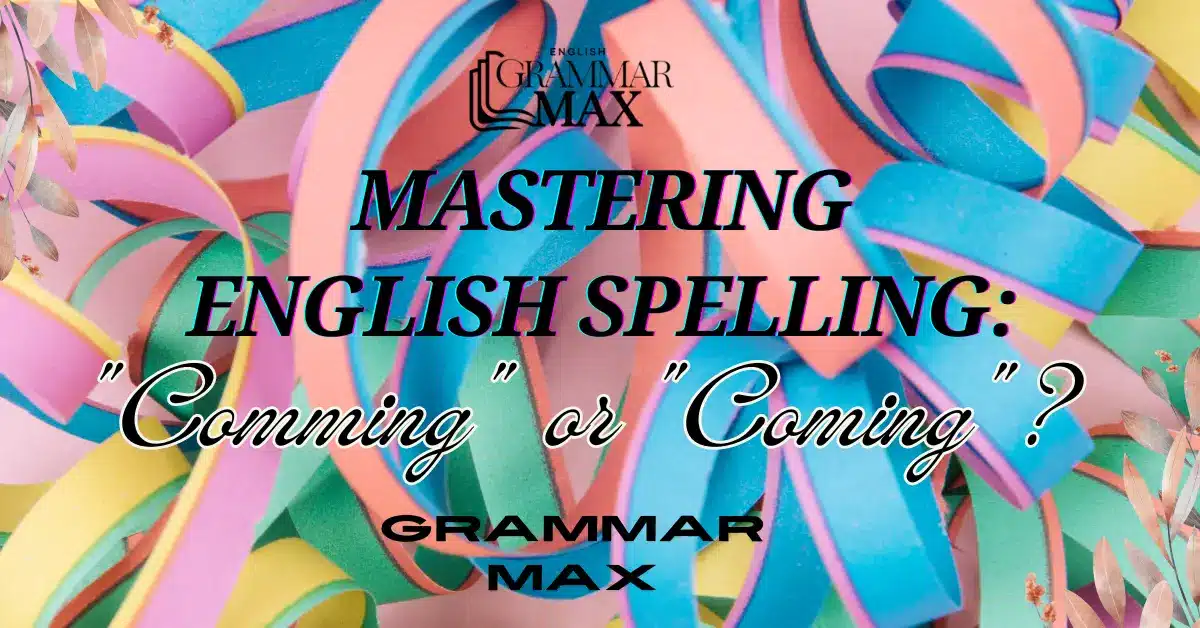These two words might look similar, but only one ‘’coming’’ is correct. Many people mistakenly add an extra “m” leading to confusion and common spelling errors.
we’ll find out why “comming” is incorrect, explain the rules behind the proper spelling, and provide helpful tips to avoid this mistake in work or writing work.
Coming Meaning: The Correct Usage
“Coming” is the present participle of the verb “come,” meaning to move or travel toward a place or person. It is used in various contexts to describe an action that is happening or will happen soon. For example:
- “She is coming to the party.”
- “The storm is coming tomorrow.”
In this sentence, “coming” conveys movement, arrival, or the anticipation of an event. The meaning and proper spelling of “coming” ensures that your writing stays clear and professional.
If you’re talking about someone arriving or something approaching, “coming” helps convey the right message with care.
Examples of “Coming” in Sentences
- She is coming to the meeting later today.
- The train is coming soon, so we should hurry.
- Are you coming to the party this weekend?
- Winter is coming, and it’s time to prepare.
- I’m looking forward to the coming events next month.
Comming Meaning: Why It’s Incorrect
The word “comming” is mostly used incorrectly, with an extra ‘’m’’ which is not an English word. This is a very common spelling of the given word. This is because many people tend to insert another “m” because of the way English applies suffixes, particularly the one “-ing.”
In contemporary English, there does not exist any meaning or application for “comming,” therefore one must take the precaution of writing “coming.” In case you substitute coming with comming while writing, it places your readers at a risk of being lost or makes you look bad.
How Grammarly Helps You Correct Words
Grammarly is a handy writing tool that helps you catch mistakes in your writing. When you type, it highlights errors in real time, showing you where you might have spelled something wrong, like “comming.”
It suggests the correct spelling, so you know to use “coming” instead. Grammarly also gives you explanations for its suggestions, which helps you understand why something is incorrect.
This way, not only do you fix mistakes, but you also learn how to avoid them in the future, making your writing better overall.
How ProWritingAid Can Help You Spell “Coming” Correctly
ProWritingAid is an excellent tool for catching spelling mistakes like “comming” instead of “coming.” It provides real-time error detection, instantly flags incorrect spellings, and offers the correct version with a simple click.
The tool also explains why a correction is needed, helping you learn as you go. By using ProWritingAid, you can easily avoid common spelling errors and ensure your writing stays polished and professional.
Frequently Asked Question
Why do people often spell “coming” as “comming”?
Many people mistakenly add an extra “m” because they think “come” follows the rule of doubling the consonant before adding “-ing.” However, the correct form is “coming,” where the silent “e” is dropped.
What is the correct spelling: “coming” or “comming”?
The correct spelling is “coming.” “Comming” is a common misspelling and does not exist in the English language.
Is there any situation where “comming” is acceptable?
No, “comming” is not accepted in standard English. The only correct form is “coming.”
How can I remember the correct spelling of “coming”?
A good way to remember is that when you add “-ing” to words ending in a silent “e” (like “come”), you drop the “e” and add “-ing.” No doubling of the “m” is needed.
Can spelling tools help avoid errors like “comming”?
Yes, tools like ProWritingAid and Grammarly highlight spelling mistakes in real-time and suggest corrections, helping you avoid errors like “comming.”
Conclusion
Accuracy in spelling is an important aspect of lucid and effective communication and therefore mastering words like ‘coming’ is imperative because it is one of the most commonly misspelled words. Although most people often spell it as ‘comming’, knowing the basic rule of dropping the silent ‘e’, you will hardly make this mistake.
Applications like Grammarly and ProWritingAid are also very helpful in maintaining the polish of your writing by eliminating such errors. Focusing on these matters can help enhance the level of accuracy in one’s writing and also minimize the possibility of mystery in the text.

William Henry is a writer for Grammar Max, a blog that focuses on synonyms and phrases. He loves exploring the quirks of the English language and enjoys helping readers improve their vocabulary. William’s articles are easy to read, fun, and full of useful tips for anyone looking to better understand and use English. Whether you’re a student, a professional, or just someone interested in language, William’s writing on Grammar Max makes learning about words and their meanings simple and enjoyable.
